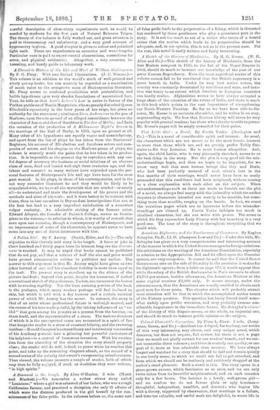A Chronicle History of the Life and Work of William
Shakeveare. By F. G. Fleay. With two Etched Illustrations. (J. C. Nimmo.)— This volume is an addition to the woild's stock of well-printed and nicely got-up books, but can scarcely be regarded as a contribution of much value to the overgrown mass of Shakespearian literature. Mr. Fleay seems to confound possibilities with probabilities, and bands hypotheses upon very slender foundations of ascertained fact. Thus, he tells us that Lore's Labour's Lost is satire in favour of the Puritan partisans of Martin Marprelate, who so greatly disturbed Queen Elizabeth's equanimity in the later years of her reign, bat gives no authority for the statement ; attributes Titus Andronicus to the pen of Marlowe, upon the sole ground of an alleged resemblance between the character of Aaron and that of Barabbas in The Jew of Malta; and finds the occasion of the production of A Midsummer Night's Dream in the marriage of the Earl of Derby, in 1595, upon no ground at all. Many other of his hypotheses are equally vague and unsatisfactory, and apart from the list of plays he has taken from the Stationers' Registers, his account of Elizabethan and Jacobean actors and com- panies of actors, and his chapter on the Marlowe group of plays, the volume is scarcely worth the pains that he has taken in its produc- tion. It is impossible at the present day to reproduce with any use- ful degree of accuracy the business or social relations of an obscure class of men, dead and buried well-nigh three centuries ago, and the labour and research so many writers have expended upon the per- sonal features of Shakespeare's life and age have been for the most part wasted. In his plays, in those of his contemporaries, and in the not very extensive literature he and they would be likely to be acquainted with, we have all the materials that are needed—or nearly all—to understand and trace the development of his genius and the methods and aims of his work ; and it were better to be content with these, than to lose ourselves in Dry-as-clast investigations that can at the best but lead to a very imperfect satisfaction of a somewhat vulgar cariosity. An admirable etching of the famous actor, Edward Alleyne, the founder of Dulwich College, serves as frontis- piece to the volume,—in relation to whom, it is worthy of remark that save upon one occasion, though a contemporary of Shakespeare, and an impersonator of some of his characters, he appears never to have come into any sort of direct intercourse with him.


































 Previous page
Previous page